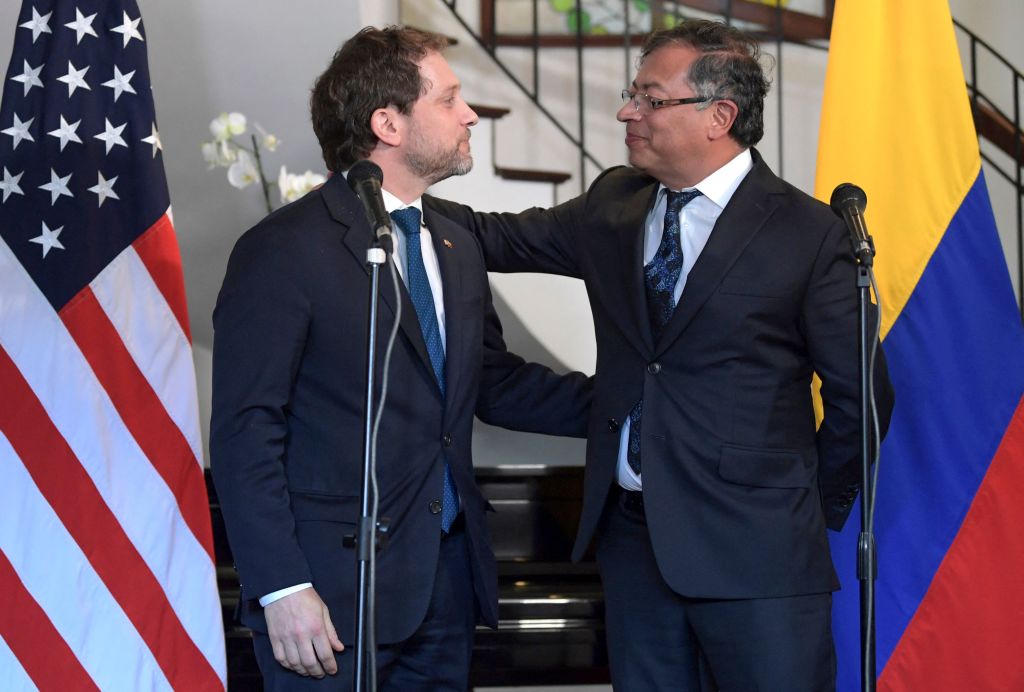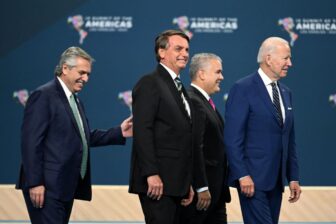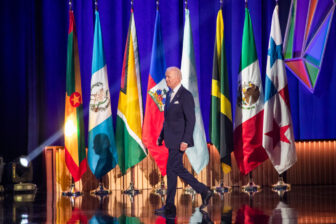After leftist Gustavo Petro won Colombia’s presidential runoff on June 19, top U.S. officials have hastened to embrace him. Secretary of State Antony Blinken tweeted his congratulations on election night and called Petro the next day. Within 48 hours of Petro’s victory, President Joe Biden also placed a call, emphasizing U.S. support for Colombia and the desire “to continue strengthening bilateral cooperation.”
Fully two weeks before Petro’s inauguration, the White House dispatched a high-level delegation to Bogotá, including Biden’s principal deputy national security adviser, the national security advisor to Vice President Kamala Harris, the assistant secretary of state for the Western Hemisphere, and the National Security Council director for the Western Hemisphere. Biden has asked U.S. Agency for International Development Director Samantha Power to head the U.S. delegation to the August 7 inauguration. Vice President Kamala Harris is rumored to join as well.
It’s a lot of love even for Colombia, which President Biden has described in recent months as the “linchpin,” “keystone” and “foundation” of security and prosperity in the hemisphere. The very intensity of the outreach speaks to a broader nerviosismo over the potential for the U.S.-Colombia relationship to go sideways during a Petro presidency.
Petro’s stated positions provide ample fodder for concern. He has criticized U.S.-backed counter-drug policies, including extradition and forced coca eradication; the two countries’ bilateral free trade agreement, saying it hurt Colombian agriculture; and oil, coal, and other hydrocarbon production, which comprises over 40% of Colombia’s export revenues and in which U.S. firms are heavily invested. Petro has also signaled his intention to re-engage with—rather than isolate—the government of President Nicolás Maduro in Venezuela and to open peace talks with the ELN guerrilla group, which the State Department designated a terrorist organization.
Whatever private concerns U.S. officials might have about the future of Petro’s government, in official statements, the Biden administration has emphasized “many areas of common ground, including combating climate change, economic development, particularly in rural areas, and expanding implementation of Colombia’s 2016 peace accord.”
Top Republicans, however, have been less generous, presaging a cooling of bipartisan support in Congress for the U.S.-Colombia relationship. Florida Governor (and likely presidential hopeful) Ron DeSantis called Petro “a former narco-terrorist and a Marxist,” saying his administration would be “disastrous.” Meanwhile, Senators Marco Rubio and Ted Cruz introduced a bill in late July to reimpose terrorism sanctions on the FARC—the sanctions were lifted last November to permit U.S. assistance for programs benefiting guerrillas who demobilized following the 2016 peace accord.
Petro’s recently-named Colombian ambassador to the U.S., Luis Gilberto Murillo, has spent years in Washington and knows the U.S. well. He is a former governor and environment minister whose stated priorities include rural development, climate and trade. While he is likely to find allies to support that agenda, he will not be able to avoid the central issue that has defined U.S.-Colombia relations for more than two decades: illegal drugs.
The relationship has expanded since the bilateral launch of Plan Colombia in 1999, an ambitious and costly effort to combat illegal narcotics and the insurgencies that profited from them. The agenda now includes robust cooperation on security, trade, environmental and technology issues. But counter-narcotics has remained central. This is because even after $13 billion in U.S. assistance over the last 22 years, Colombia remains the world’s largest cocaine producer and the U.S. remains the biggest consumer market for the drug. Large bureaucracies of civilian and military officials in both countries exist to combat narcotics and the violent transnational criminal groups that traffic them.
Despite efforts by the outgoing administration of President Iván Duque, coca cultivation reached an all-time high in 2020—245,000 hectares—and in 2021 the figure remains 28% higher than it was in 1999 when Plan Colombia began. Metrics of success and failure devised by the Biden administration no longer focus on coca cultivation and cocaine production alone. But the persistence of illicit crops and the criminal violence around drug production and trafficking are central facts of life, especially in rural areas.
The International Committee of the Red Cross reported that rural violence in 2021 “reached the highest level of the last five years.” A toxic stew of six separate conflicts is pitting violent, drug-trafficking paramilitary and guerrilla groups against the state and each other. The fighting is driving displacement, massacres and targeted assassinations of human rights and civil society activists.
Petro and his vice president-elect, Afro-Colombian environmental activist Francia Márquez, say the increase in coca cultivation and surging violence in the countryside reflect the failure of Colombia’s U.S.-backed anti-drug and security strategies.
Márquez has said the objective of the new administration is to protect and improve the lives of the rural population, including communities where coca is grown. That means a deeper commitment to the peace agreement, especially its provisions on land and rural reform, which lag the most in terms of implementation.
It is still unclear, however, how the new government views the interplay between rural development and security. Experience has shown that one cannot work without the other. Just as unclear is how the Petro administration will act toward the Colombian armed forces and police and achieve their buy-in for its new approach.
The appointment of crusading prosecutor Iván Velásquez as defense minister signals that the fight against corruption, impunity and human rights abuses will be a top priority. What is less evident is how Velásquez will address other challenges including the deteriorating security in rural areas and the ongoing cross-border conflict with the ELN and other groups, or preserve strong civil-military relations. Velásquez once investigated members of Congress for links to paramilitary groups, sending over 50 to jail. He will likely struggle to gain the confidence of those in uniform.
For now, the Biden administration seems to be keeping an open mind about the future of the bilateral relationship, aware that much will change. “It doesn’t matter who is Colombia’s president,” the National Security Council’s Juan Gonzalez recently told a Colombian radio station. “We want the country to prosper.”
The question is whether the new Petro administration and the vested interests in both countries, long accustomed to shared assumptions about the strategic relationship, will be equally accommodating.







